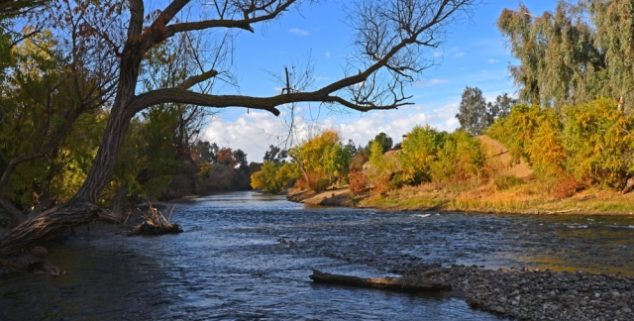Opinion
Water storage needed — but keep faith with Prop. 1
 The Kern River flows through Hart Park near Bakersfield. (Photo: Richard Thornton
The Kern River flows through Hart Park near Bakersfield. (Photo: Richard ThorntonIn the midst of California’s severe drought back in 2014, more than 67-percent of California voters helped to pass Proposition 1, the $7.5 billion water bond to fund water quality, supply, treatment and storage projects.
In the nearly four years since the bond’s passage we have seen the last historic drought come to an end, but the reprieve may be short-lived. And one fact remains unchanged: California still desperately needs to develop additional storage to capture runoff in above-average water years.
The proposal by Kern County-based Semitropic Water Storage District does the very opposite of what voters were promised when they passed Proposition 1.
The California Water Commission is currently evaluating 11 proposals that are competing for $2.7 billion of the Prop. 1 funds set aside for storage projects. In December, the applicants made their cases directly to the commissioners in Sacramento, describing their purported “public benefits” to satisfy Proposition 1’s funding requirements.
Many of the projects are worthy proposals offering benefits to the public that would offset their costs. But the proposal by Kern County-based Semitropic Water Storage District (the “Tulare Lake Storage and Floodwater Protection Project”), which aims to export floodwater from the Kings River basin for the benefit of private landholders outside the area, does the very opposite of what voters were promised when they passed Proposition 1.
As the more than 40 local governments, elected officials, water districts and small business leaders that announced their opposition before the Water Commission hearing agreed, Semitropic’s proposal is a half-baked, “cart before the horse” proposal costing hundreds of millions of taxpayer dollars that is full of problems too great to overcome.
As presented, this project may appear harmless, but in reality, the project proponents have failed to disclose the negative impacts to the area of origin.
Contrary to Semitropic’s claims before the Water Commission, there are no actual public benefits from this project for the Kings River nor the hundreds of thousands of residents of Fresno, Kings, and Tulare counties who depend on its water. Rather, there will only be direct losses resulting from the removal of local water.
Its true benefits are instead designed for a select group of landowners in Semitropic’s service area and its private partner, Sandridge Partners (as the Bakersfield Californian has previously reported, Sandridge Partners was paid $40 million by Semitropic for an easement, or right of way, on the land acquired for the project, plus granted a first priority right to 260 cubic feet per second of water from the project.
The flaws with Semitropic’s proposal don’t end there.
With a price tag of more than $600 million ($452 million of which would be paid for with Proposition 1 funds), the project proposes to use the California Aqueduct to transfer naturally occurring water supply from the Kings Basin, one of the most critically over-drafted basins in the state, to the Kern County groundwater basin. Yet Semitropic has no right or license to the waters of the Kings River. Furthermore, California State Water Resources Control Board has determined that the Kings River is “fully-appropriated” — there is no additional water available.
And quite significantly, Semitropic’s proposal poses direct threats to people’s right to access safe, clean, affordable and accessible water and threatens groundwater sustainability efforts – a right guaranteed under California law.
The Kings River service area includes 51 “disadvantaged communities” (defined as areas which most suffer from a combination of economic, health, and environmental burdens) with a combined population of 646,236. The area also includes 59 “severely disadvantaged communities” with a population of 84,510.
Denying these communities access to water and jeopardizing long-term sustainability will only make already-difficult circumstances worse.
And by exporting water from critically over-drafted groundwater basins, the Semitropic project would make it nearly impossible for the Kings and Tulare basins and their seven Groundwater Sustainability Agencies to comply with the requirements of Sustainable Groundwater Management Act.
Allowing Semitropic to violate the principal of “local water for local needs,” and the precedent doing so would establish, would have wide-ranging implications extending far beyond the Kings River service area.
The California Water Commission should note the widespread opposition from throughout the region and reject Semitropic’s application. Prop. 1 funds should not be granted to a project that runs directly counter to the public’s interest, harms groundwater sustainability efforts, and threatens access to safe, clean, affordable and accessible water.
—
Ed’s Note: Larry Cruff is chairman of the Kings River Water Association, and Frank Zonneveld is vice-chairman.
Want to see more stories like this? Sign up for The Roundup, the free daily newsletter about California politics from the editors of Capitol Weekly. Stay up to date on the news you need to know.
Sign up below, then look for a confirmation email in your inbox.

Leave a Reply